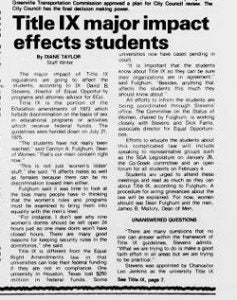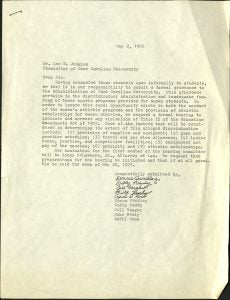Celebrating the 50th anniversary of Title IX
“Uppity Women: The History and Future of Title IX” is scheduled for Sept. 22. A panel conversation will be held in the Faulkner Gallery, beginning at 4 p.m. featuring representatives from University Archives and the Gender Studies Program joined by ECU’s Office for Equity and Diversity and ECU Athletics. Join us to take a look back at the history of Title IX’s impact on campus and how the university is continuing to support students, staff and faculty currently and plans for the future to ensure gender equality!
June 23 marked the 50th anniversary of the signing of Title IX legislation by President Richard Nixon. Part of the Education Amendments of 1972, Title IX prohibits any educational institution that receives federal funding from discriminating based on an individual’s sex. It fills a gap in the Civil Rights Act of 1964, which despite outlawing discrimination based on race, color, religion, sex or national origin, failed to address discrimination based on an individual’s sex for those employed or enrolled at an educational institution.

Fountainhead, January 22, 1967. East Carolina University Campus Newspapers. UA50-05. University Archives, East Carolina University, Greenville, NC.
Nixon assigned the task of implementing the new legislation to the Department of Health, Education and Welfare (HEW). Three years later in June 1975, HEW published
its final regulations and enforcement guidelines for Title IX. Since then, the federal government has consistently published reports on how Title IX legislation should be enforced and interpreted by all.

Letter to Chancellor Leo Jenkins from Debra Newby, Donna Pendley, Jill Vaugh, Mike Healey, and April Ross. May 2, 1978. Records of the Office of Equity and Diversity. UA21-10. University Archives, East Carolina University, Greenville, NC.
While most of the early attention around Title IX related to gender equality in athletics, the first real change to ECU policies was related to tuition and financial aid. In the spring of 1974, ECU dropped a longstanding rule that required a married female student to claim the same residency as that of her husband. Prior to this policy change, married female students could be charged higher tuition prices simply for having married a male classmate who was from outside of North Carolina. Other changes included the awarding of athletic scholarships to female students, the changing of student life rules that were discriminatory against females and even the cancellation of the ECU men’s soccer team. A 1978 student grievance brought even more changes as outlined in a “Plan to Strengthen Women’s Athletics and Comply with Title IX Guidelines,” which was approved by Chancellor Thomas Brewer.
